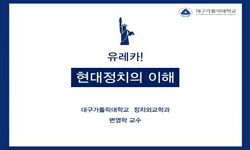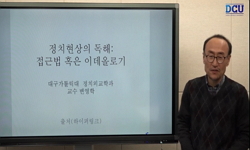본고에서는 이스토프(Antony Easthope)의 사회적 판타지(social phantasy) 개념을 원용하여 김수영의 시를 분석했다. 김수영의 시에 표면적으로 드러난 기표를 통해 이데올로기적 측면과 판타지적 측...
http://chineseinput.net/에서 pinyin(병음)방식으로 중국어를 변환할 수 있습니다.
변환된 중국어를 복사하여 사용하시면 됩니다.
- 中文 을 입력하시려면 zhongwen을 입력하시고 space를누르시면됩니다.
- 北京 을 입력하시려면 beijing을 입력하시고 space를 누르시면 됩니다.

김수영 시(詩)의 사회적 판타지 - 근대 이데올로기와 강박증적 주체를 중심으로 - = A Study on Social Phantasy of Poetry of Kim Su-young: Focusing on Modern Ideology and Compulsive Principal Subject
한글로보기https://www.riss.kr/link?id=A102922062
- 저자
- 발행기관
- 학술지명
- 권호사항
-
발행연도
2014
-
작성언어
Korean
- 주제어
-
등재정보
KCI등재
-
자료형태
학술저널
- 발행기관 URL
-
수록면
9-42(34쪽)
- 제공처
-
0
상세조회 -
0
다운로드
부가정보
국문 초록 (Abstract)
본고에서는 이스토프(Antony Easthope)의 사회적 판타지(social phantasy) 개념을 원용하여 김수영의 시를 분석했다. 김수영의 시에 표면적으로 드러난 기표를 통해 이데올로기적 측면과 판타지적 측면에서 기의를 동시에 파악하고 이를 통해 사회적 욕망과 무의식적 욕망이 상호교섭하는 양상을 포착하는 것이 본고에서 수행한 작업이었다. 김수영의 시는 4·19 혁명을 기점으로 세 시기로 구분된다. 첫 번째 시기는 해방 이후부터 4·19 혁명 이전 무렵이다. 이데올로기적 측면에서는 근대적 주체의 정립문제가 부각되었으며 판타지적 측면에서는 온전히 자립적인 주체, 곧 완전한 주체를 추구하는 욕망이 발생했다. 두 번째 시기는 4·19 혁명이 일어난 즈음의 시기이다. 이데올로기적 주체와 판타지적 주체는 통합되며 혁명이라는 사건을 통해 시적 화자는 비로소 오이디푸스 콤플렉스를 경험하게 된다. 세 번째 시기는 4·19 혁명이 좌초된 이후의 시기로 혁명의 실패는 화자에게 강박증적 퇴행 현상을 가져온다. 특히 여성에 대한 멸시와 부정을 들 수 있는데 이는 화자의 오이디푸스적 혼란을 반영한다. 동시에 이 시기는 내면의 갈등을 해소할 전망을 타진하던 시기이기도 하다. 대표적으로 「거대한 뿌리」, 「사랑의 변주곡」, 「풀」에서 이러한 지향이 나타나는데 유토피아적 전망을 통해 시적 화자의 분열을 봉합할 가능성을 찾게 된다. 이상과 같이 김수영의 시는 시대적 소명과 내면의 욕망이 역동적으로 결합된 사회적 판타지를 형성하고 있다. 그리고 김수영의 시에서 사회적 판타지를 추적하는 본고의 논의는 그의 시를 총체적으로 독해하는 데 있어 부족하나마 의의를 지닐 것이다.
다국어 초록 (Multilingual Abstract)
This study analyzes Kim Su-young`s poetry, quoting Antony Easthope`s terminology, Social Phantasy. The research grasps the meaning in both aspects of ideology and phantasy through the signifiants apparently represented in poems and captures an aspect ...
This study analyzes Kim Su-young`s poetry, quoting Antony Easthope`s terminology, Social Phantasy. The research grasps the meaning in both aspects of ideology and phantasy through the signifiants apparently represented in poems and captures an aspect of the interaction between social desire and unconsciousness desire. April 19th Revolution is the starting point of periodization of Kim`s poems into three parts. The first term applies to a period of `after independence of Korea to before April 19th Revolution`. The issue of founding a modern principal subject was being magnified in ideological aspect while a desire to pursue a completely independent main subject, a perfect one, occurred in the aspect of phantasy. The April 19th Revolution period is the second part. Principal subjects in each aspect of ideology and phantasy were combined during this period. A poetic persona, at last, experienced Oedipus complex through the revolution. A period of after the failure of April 19th Revolution applies to the last period, the third term. The failure of the revolution made the poetic persona show compulsive regressive traits. The poetic persona`s contempt tendency toward and negation o f females could be a concrete example. This reflected persona`s confusion in Oedipus complex. The third term was, at the same time, the very period in which the poetic persona tried to settle the internal conflicts. Some of Kim`s literary works such as < Colossal Roots >, < Variations on the Theme of Love >, < Grass > are the typical examples to show this tendency. In these poems, the possibility is found to suture the split of poetic persona through utopian prospect. As explained, literary works from Kim Su-young formulated a social phantasy in which the needs of the time and internal desire dynamically combine. In this point, this study, pursuing social phantasy in Kim Su-young`s poems, is meaningful to holistically understand Kim`s works.
동일학술지(권/호) 다른 논문
-
궁색한 시대, 김수영과 하이데거 - 「모리배」전후를 중심으로 -
- 국제어문학회 ( 구 국제어문학연구회 )
- 임동확 ( Lim Dong-hwak )
- 2014
- KCI등재
-
- 국제어문학회 ( 구 국제어문학연구회 )
- 김희정 ( Kim Hui-jeong )
- 2014
- KCI등재
-
- 국제어문학회 ( 구 국제어문학연구회 )
- 서경숙 ( Suh Kyoung-sook )
- 2014
- KCI등재
-
효행담(孝行談)에 나타난 부모의 역할과 공감(共感)의 문제
- 국제어문학회 ( 구 국제어문학연구회 )
- 이강엽 ( Lee Kang-yeop )
- 2014
- KCI등재




 KISS
KISS






